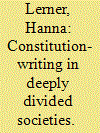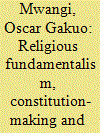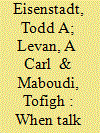| Srl | Item |
| 1 |
ID:
095086


|
|
|
|
|
| Publication |
2010.
|
| Summary/Abstract |
The article addresses the puzzle of how societies still grappling over the common values and shared vision of their state draft a democratic constitution. It argues that an incrementalist approach to constitution-making enabled such deeply divided societies to enact either a written constitution or function with a material constitution by deferring controversial choices regarding the foundational aspects of the polity to future political institutions. It demonstrates how various types of incrementalist constitutional strategies - such as avoidance of clear decisions, the use of ambivalent and vague legal language, or the inclusion of contrasting provisions in the constitution - were deployed in the constitutional drafting of three deeply divided societies: India, Ireland and Israel. By importing the existing ideational conflicts into their constitutions, and by deviating from the common perception of constitution-making as a revolutionary moment, the framers in these three cases enabled their constitutions to reflect the divided identity of 'the people'.
|
|
|
|
|
|
|
|
|
|
|
|
|
|
|
|
| 2 |
ID:
103634


|
|
|
|
|
| Publication |
2011.
|
| Summary/Abstract |
Nepal made little headway in its peace process in 2010. The Constituent Assembly missed the May deadline for completing the new Constitution, and a crisis in governance followed the prime minister's resignation in June. Repeated rounds of voting failed to elect a new leader. Meanwhile, democratization in Bhutan progressed slowly because local elections were delayed.
|
|
|
|
|
|
|
|
|
|
|
|
|
|
|
|
| 3 |
ID:
113915


|
|
|
|
|
| Publication |
2012.
|
| Summary/Abstract |
Nepal's political transition to a democratic federal republic remains incomplete. A November 2011 agreement on post-conflict integration and rehabilitation offers reason for hope. Continued disagreements over the structure of the federal state and its form of government have delayed the constitution-making process. Corruption, impunity, and weak infrastructure combine to erode Nepali confidence in effective governance. Bhutan's democratic exercise continues to be carefully controlled by entrenched elites, but the country held its first-ever local elections successfully and economic growth stabilized.
|
|
|
|
|
|
|
|
|
|
|
|
|
|
|
|
| 4 |
ID:
111176


|
|
|
|
|
| Publication |
2012.
|
| Summary/Abstract |
This article examines religious fundamentalism, constitution-making and democracy in Kenya with regard to the arguments surrounding the inclusion of the Kadhis Courts in the country's new Constitution promulgated on 27 August 2010. Kadhis Courts deal with matters of Muslim law and have been entrenched in Kenya's Constitution since the country's independence in 1963. The article argues that the Church and clergy took a fundamentalist position regarding the inclusion of the Courts with the aim of influencing the country's predominantly Christian voters to reject the proposed new constitution at the referendum stage. Kenyans, however, the majority of whom are Christians, overwhelmingly endorsed the constitution. The article underscores that the Church, therefore, lost its moral responsibility and institutional legitimacy as an agent of democracy. The Kenyan experience indicates citizens can ignore religious fundamentalism for the common good of society.
|
|
|
|
|
|
|
|
|
|
|
|
|
|
|
|
| 5 |
ID:
140815


|
|
|
|
|
| Summary/Abstract |
Under what circumstances do new constitutions promote democracy? Between 1974 and 2011, the level of democracy increased in 62 countries following the adoption of a new constitution, but decreased or stayed the same in 70 others. Using data covering all 138 new constitutions in 118 countries during that period, we explain this divergence through empirical tests showing that overall increased participation during the process of making the constitution positively impacts postpromulgation levels of democracy. Then, after disaggregating constitution-making into three stages (drafting, debating, and ratification) we find compelling evidence through robust statistical tests that the degree of citizen participation in the drafting stage has a much greater impact on the resulting regime. This lends support to some core principles of “deliberative” theories of democracy. We conclude that constitutional reformers should focus more on generating public “buy in” at the front end of the constitution-making process, rather than concentrating on ratification and referendums at the “back end” that are unlikely to correct for an “original sin” of limited citizen deliberation during drafting.
|
|
|
|
|
|
|
|
|
|
|
|
|
|
|
|